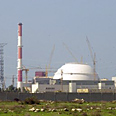The head of a Middle Eastern regime committed to securing “atomic weapons at any costs” threatens to “drive Israel into the sea.” Iran’s President Ahmadinejad today? No, Egypt’s Gamel Abdel Nasser in the 1960s. Rather than wait around to see if Nasser was serious, Israel developed its own deterrent nuclear capacity, refusing to release details but pledging never to be the first to introduce nukes in the region.
For 40 years, Israel has honored its “no first use” policy, not only in theory, but in practice in 1973 when its very survival was threatened by the combined Egyptian-Syrian surprise Yom Kippur attack that could have been easily repulsed by tactical nuclear weapons. Israel has never signed the Nuclear Non-Proliferation Treaty, though it attended a 2008 conference dedicated to removing the threat of nuclear war from the Mideast. Contrast Israel’s consistent non-provocative behavior with North Korea which signed it, violated it to develop nuclear weapons and missiles, and then withdrew from the Treaty!
The US’ pursuit of non-proliferation has been far from stellar. In 2000, Secretary of State Madeleine Albright gave a basketball signed by Michael Jordan to Kim Jong-Il - a big fan of the NBA but, unfortunately, also of nukes. The subsequent Bush Administration’s pursuit of a full-court diplomatic press through six-power talks to restrain North Korea proved an abject failure. Pakistan followed India in unleashing the nuclear genie on the subcontinent, and then allowed national hero Sir Ahmad Khan to proliferate nuclear weapons technology from Tehran to Pyongyang. Today, the world holds its collective breath with the Taliban at the gates of Islamabad and way too close to Pakistan’s nuclear arsenal.
Now, there are signs that the Obama Administration’s strategy to curb nuclear proliferation in the Mideast may lead more through Jerusalem than Tehran. Faced with Iran’s defiance of the International Atomic Energy Commission (IAEC) inspectors and UN Security Council Resolutions designed to curb its development of thousands of nuclear centrifuges, President Obama has committed to “no strings” negotiations to change Tehran’s mind. Americans pray that this approach has more success than the prior carrots-and-sticks approach.
Yet one would have thought that the Arab States - and the United States - share the Jewish State’s interest in preventing the apocalyptic Ahmadinejad from acquiring the imminent nuclear means to go with his long-proclaimed vision to “wipe Israel from the map,” to destroy the American “Great Satan” - and, along with it, the entire Mideast state system. While such a coalition may yet emerge, there are confusing signals emanating from Washington.
Following Secretary of State Hillary Clinton’s observation that Arab states could not be expected to cooperate with Israel in curbing Iranian nuclear ambitions unless Jerusalem was quick to make a deal with the Palestinians, White House Chief of State Rahm Emanuel told leaders of American Israel Public Affairs Committee (AIPAC) that the US could not be expected to work effectively to protect Israel from the Iranian nuclear threat unless an independent Palestinian state is created forthwith.
New ticking time bomb
Next, at an international conference in New York, Assistant Secretary of State Rose Gottemoeller broke with 40 years of consistent US policy by explicitly demanding that Israel join India, Pakistan, and North Korea in signing the Non-Proliferation Treaty. Is the government’s use of a seemingly moral equivalence regarding nukes between Israel, rogue states like North Korea, and failed states like Pakistan really going to make the Mideast more secure or further international efforts to restrain Tehran’s mad mullahs?
Apparently, some folks no longer see a nuclear Iran as such a bad thing. Atlantic Monthly blogger Andrew Sullivan admits that “I’m not versed in the history of this,” yet speculates that an Iranian nuke or two might be a wholesome counterpoint to a warmongering Israel, which he charges demands “the right to launch wars and threaten wars against its neighbors.” Sullivan is apparently tone deaf to the daily genocidal rants from Tehran and its minions among Lebanese Hizbullah and Palestinian Hamas. He sorrowfully predicts that he may be equated with classic anti-Semites. What else can he expect, given the way he echoes the likes of Henry Ford whose favorite taunt was “wars are the Jews’ harvest”?
Even Israel’s greatest critics acknowledge that Shimon Peres, currently Israel’s President, is the Jewish state’s most ardent advocate for peace with the Palestinians and the larger Arab neighborhood. Less known is that he was the father of Israel’s secret nuclear efforts, dating back a half a century. In April, 1963, he told President Kennedy at the White House that “Israel would not be the first to introduce nuclear weapons to the Middle East.”
Hence, it carried special significance that long before the election of Barak Obama, Peres himself told Egyptian President Hosni Mubarak that Israel would be willing to sign the Nuclear Non-Proliferation Treaty within two years after the establishment of “regional peace.” President Peres believes that it was Israel’s unstated but obvious nuclear capabilities that helped set the stage for peace with Egypt and that may yet encourage others to follow - but not if Iran’s fanatics get their way.
Want Mideast peace? None of America’s strategic goals will be served by the debasing of Israel’s nuclear deterrence. All that would do is further embolden the Mullahs, force Hosni Mubarak to go nuclear - not to counter Jerusalem but Tehran - and move the neighborhood that much closer to Armageddon, even if there's a brokered Israel-Palestinian deal. In pursuit of a new day for the Middle East, President Obama must take special care not to trigger a new ticking time bomb in what is already the world’s most dangerous neighborhood.
Rabbi Abraham Cooper is associate dean of the Simon Wiesenthal Center
Dr. Harold Brackman, a historian is a consultant to the Wiesenthal Center
















